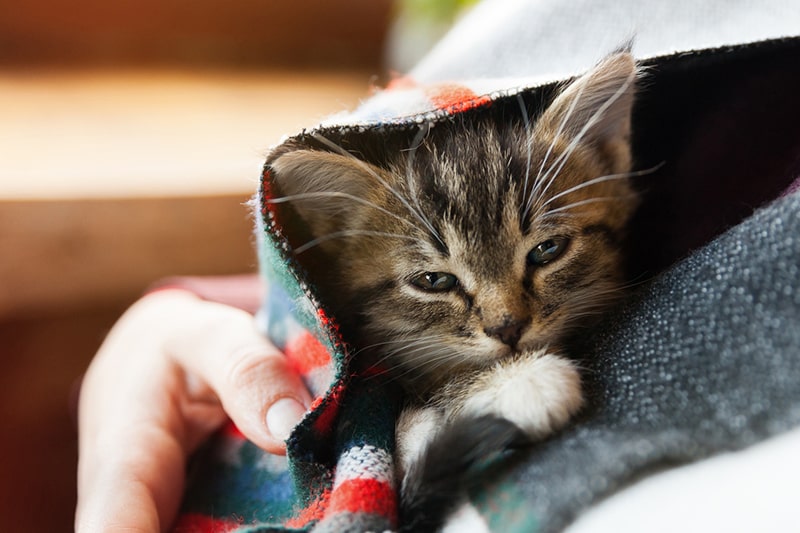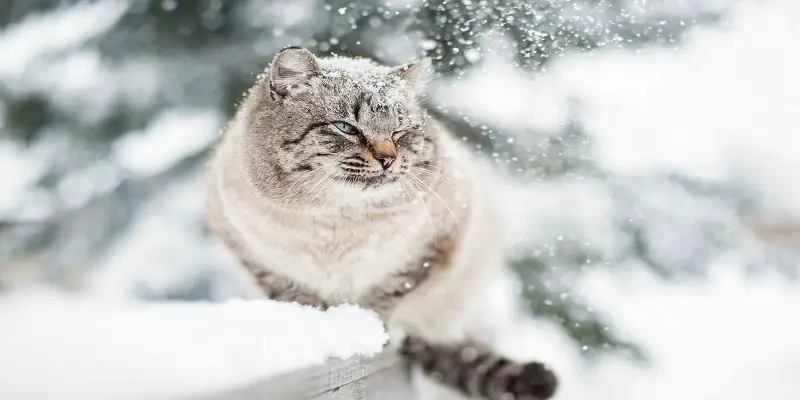Yes, cats can tolerate cold weather, but they do not necessarily enjoy it. As natural hunters, cats have evolved to survive in various environmental conditions.
However, their adaptability does not mean that they prefer a cold climate. In fact, most cats prefer to stay warm and cozy indoors during the winter months. Cats are creatures of comfort and can sense changes in temperature much better than humans.
When the temperature drops, cats tend to curl up in warm places to maintain their body temperature. Some may also seek out cozy spots near heaters or in sunny areas to bask in the warmth. However, exposure to cold temperatures for extended periods can lead to hypothermia, frostbite, and other health issues. If you live in a region with cold weather, it is essential to provide your feline friend with a warm and safe environment. In this article, we will explore various aspects of cats and cold weather – their adaptability, behaviors, and ways to keep them healthy and happy during winters.

Credit: www.aspcapetinsurance.com
Factors That Affect A Cat’S Tolerance For Cold Weather
Do you own a feline friend and wonder if they are comfortable during the colder months? While cats are generally known for their love of cozy warmth, their ability to withstand cold temperatures varies greatly. Factors like fur type and length, age and health condition, breed, and acclimation can significantly affect a cat’s tolerance for cold weather.
Fur Type And Length
A cat’s fur type and length play a crucial role in how well they can tolerate cold weather. Some cats have a thick undercoat and longer topcoat suited for colder climates while others have a thinner and shorter coat. For example, the norwegian forest cat, maine coon, and siberian breeds have a double coat of long, thick fur that helps them stay warm even in frigid temperatures.
However, breeds like the sphynx, cornish rex, and devon rex, are not well-suited for colder climates because they have no or fine hair.
Age And Health Condition
Age and health condition also contribute to a cat’s ability to tolerate cooler temperatures. Young kittens and senior cats are more susceptible to hypothermia and frostbite since their bodies generate less heat than adults. Moreover, cats with underlying health conditions like arthritis, hypothyroidism, or heart disease, may struggle to regulate their body temperature during colder weather.
Breed
As mentioned earlier, certain cat breeds are better adapted to cold weather compared to others. However, it is essential to remember that every cat is unique, and even those bred for cold climates may not prefer it. For instance, while the siberian cat is known for its ability to handle cold weather, not every siberian cat is comfortable outdoors in freezing temperatures.
Acclimation
Lastly, acclimation is a critical factor in how well a cat can tolerate cold weather. A cat’s body gradually adapts to its surroundings, so if they’ve not experienced colder temperatures before, they may not be able to tolerate it initially.
It’s best to introduce a cat to cold weather slowly by keeping them indoors with the heat on and gradually lowering the temperature over a few weeks.
A cat’s fur type and length, age and health condition, breed, and acclimation all play a crucial role in how well they’re able to tolerate colder weather. As a responsible pet parent, it’s essential to keep a close eye on your cat’s behavior and body language during the colder months and provide them with the necessary care and attention they need to stay warm and comfortable.
Signs That Your Cat May Not Enjoy Cold Weather
Do Cats Like Cold Weather?
Cats are fascinating creatures that many pet owners adore, but have you ever wondered if they love winter as much as humans do? Some cats thrive in cold weather, while others avoid it as much as they can. To help you better understand your feline friend’s relationship with winter, let’s take a closer look at the signs that indicate they may not enjoy the cold.
Physical Signs Like Shivering, Low Body Temperature, And Lethargy
When cats feel cold, their bodies react in different ways. Here are a few physical signs that your cat may show if they are not enjoying the cold weather:
- Shivering: Cats shiver when they are cold, much like humans do. If your cat is shivering, it’s a sign that they are not comfortable.
- Low body temperature: A cat’s normal body temperature ranges between 100.5°f and 102.5°f. In cold weather, their body temperature may drop below normal, leading to different health issues.
- Lethargy: When cats feel cold, they tend to conserve their body energy to maintain body heat. This may result in them being less active than usual.
Behavioral Cues Like Staying Indoors, Seeking Warm Places, And Avoiding The Cold
Just like humans seek warm places during the wintertime, cats also tend to avoid the cold by taking shelter. Here are some behavioral cues that your cat may exhibit if they don’t enjoy the cold weather:
- Staying indoors: If you notice your cat spending more time than usual indoors during the winter months, it could be a sign that they are not enjoying the cold weather.
- Seeking warm places: Cats love to snuggle, especially when it’s cold. If your cat is seeking out warm and cozy spots, such as blankets, pillows, or even your lap, it’s an indication they are feeling chilly.
- Avoiding the cold: Just like you would avoid going out when it’s freezing cold, your cat will do the same. They might even refuse to leave their warm spot.
Understanding your cat’s preferences is essential to keep them healthy and happy, especially during the colder months. Keep an eye out for these signs, and be sure to provide them with a warm and cozy environment to help them through the winter months.
Ways To Help Your Cat Enjoy Cold Weather
Cats are known for their love of warmth and comfort. However, this does not mean that they can’t enjoy the cold weather. With proper care and attention, you can help your furry friend embrace the winter season. In this blog post, we will share some ways to help your cat enjoy cold weather.
Provide Indoor Entertainment And Activities
When it’s cold outside, your cat may be more inclined to stay indoors. To prevent boredom and keep them active, provide them with indoor entertainment and activities. Here are some ideas:
- Create a cozy play area with toys, scratching posts and tunnels. This will give your cat a fun space to play in and burn off some energy.
- Train your cat with new tricks or behaviors. This could be an opportunity to teach them how to fetch or walk on a leash.
- Consider setting up puzzle feeders or treat-dispensing toys. This can keep your pet engaged and mentally stimulated, which can help improve their overall wellbeing.
Give Your Cat Warm And Cozy Bedding
Just like humans, cats love to snuggle up in warm and cozy bedding during cold weather. Here are some things to keep in mind when choosing bedding:
- Opt for plush and insulated materials like fleece, wool, and sherpa. These materials will trap heat and keep your cat warm.
- Ensure the bedding is large enough for your cat to stretch and move around comfortably.
- Place the bedding away from any drafts or cool air currents, such as near windows and doors.
Consider Purchasing Winter-Appropriate Accessories And Gear
In addition to bedding, there are several winter-appropriate accessories and gear that can help your cat stay warm and comfortable during cold weather:
- Coats or sweaters: If your cat is shorthaired or hairless, consider investing in a coat or sweater to keep them warm when outdoors.
- Booties: Protect your cat’s paws from harsh winter elements with booties. These can also be useful for preventing ice or salt from getting stuck between their toes.
- Heated beds: If your cat has difficulty staying warm, you can invest in a heated bed. These beds have a built-in heating element to maintain a warm and cozy temperature.
Ensure Your Cat Is Well-Fed And Hydrated
During cold weather, your cat may need extra calories to maintain body heat. Ensure that they are well-fed and hydrated to keep them healthy and comfortable. Here are some tips:
- Provide a high-quality, protein-rich diet.
- Ensure that your cat has access to fresh, clean water at all times. This is particularly important during winter when indoor air can be dry. Consider using a water fountain to encourage drinking.
- Monitor your cat’s weight and adjust their diet as needed. Overweight cats may have trouble staying active and keeping warm during cold weather.
With these tips, you can ensure that your cat is comfortable and happy during the cold weather season. Remember, giving your cat the love and attention they need during winter will make all the difference!
Frequently Asked Questions For Do Cats Like Cold Weather?
Do Cats Like Cold Weather?
Yes, cats are naturally adapted to cold weather due to their thick fur coat.
How Do Cats Cope With Cold Weather?
Cats can stay warm by seeking shelter and sunbathing, or by snuggling up to humans or other animals.
Can Cats Get Sick From Cold Weather?
Yes, cats can get sick from extended exposure to cold weather, so it’s important to provide shelter and keep them warm.
Should I Keep My Cat Indoors During Cold Weather?
It’s recommended to keep cats indoors during extreme cold weather to keep them safe and warm.
How Can I Keep My Cat Warm In Cold Weather?
Provide your cat with a warm bed, a cozy blanket, and access to a warm indoor space. You can also buy a heated cat bed.
Conclusion
Cats have a strong ability to adapt to different environments, and cold weather is no exception. While some cats may prefer the warmth of indoors during the winter season, others may actively seek out the colder temperatures and enjoy playing in the snow.
It’s important to note that regardless of a cat’s preference, pet owners should take necessary precautions to ensure their feline friends are protected from the cold. Providing a warm shelter, avoiding prolonged exposure to below-freezing temperatures, and providing plenty of nourishing food and water are essential to keeping cats happy and healthy in cold weather conditions.
By keeping these tips in mind, cat owners can rest assured that their furry friends will be comfortable, safe, and content during the winter months.
Last Updated on January 14, 2025 by Pauline G. Carter

